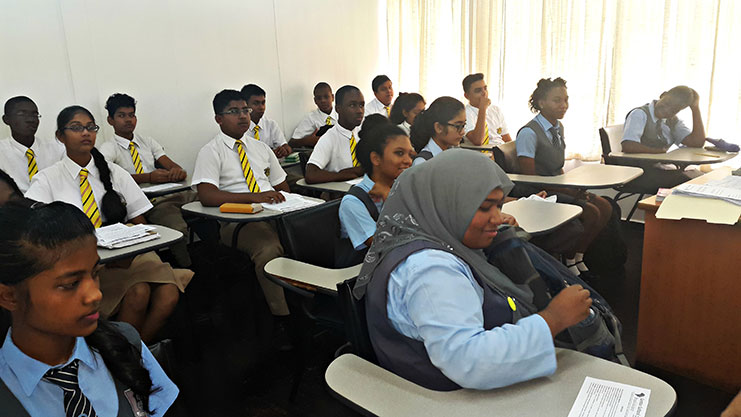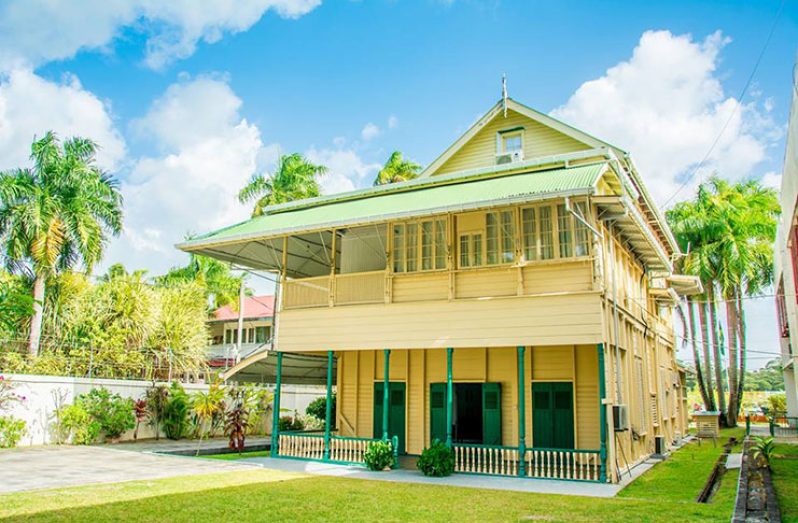By Gibron Rahim
‘OLÁ!’
Anyone who has some knowledge of the language will recognise that this word means ‘hello’ in Portuguese. Those who are even more familiar with the language will be able to carry on a conversation after hearing this greeting. It is undeniable that mastering a second language is an invaluable asset in a fast-paced world. Being able to speak Portuguese, or Spanish, or Mardarin, can provide a crucial leg up. But there is more at play than individual gains and the work being done by the Centro Cultural Brasil-Guiana (CCBG) is a prime example. The initiatives being undertaken by CCBG provide opportunities for cultural exchange and economic advancement.
CCBG is not unique, in the sense that it is one of 21 Brazilian Cultural Centres located across four different continents, each under the jurisdiction of their respective Brazilian embassies, which aim to provide training in the language and culture of Brazil to foreigners. The countries are as varied as Mexico, Finland and Guinea-Bissau. The centre in Georgetown was inaugurated on March 15, 1970 with its purpose being to serve the Brazilian diplomatic mission in Guyana. Continuing this legacy is CCBG’s current Director, Doraci Porter.

Portuguese on the syllabus
The Caribbean Examination Council (CXC) has from this year introduced Portuguese as a CSEC subject. This follows Guyana and Brazil’s efforts to have the subject added to the CXC curriculum and comes almost four years after the Ministry of Education launched Portuguese as a new foreign language in the school system. Classes for secondary school students and public secondary school teachers are among the centre’s current focuses. Porter explained to the Pepperpot Magazine that CCBG’s support for Guyana’s Portuguese language education was born from a meeting the Brazilian ambassador, Lineu Pupo de Paula, had with the then Minister of Education, Dr. Rupert Roopnaraine.
The Minister had signalled his commitment to the teaching of the Portuguese language at the secondary school level and had requested support from the Brazilian government in training Guyanese teachers for Portuguese language instruction. “In response to the Minister’s request, CCBG prepared a special Portuguese course for the secondary students and teachers,” Porter said. Currently, CCBG offers a free weekly class to the teachers.
The main focus of the classes she noted is to provide an opportunity for teachers to improve their knowledge and technical skills in teaching Portuguese. Secondary school students are also catered for. Free weekly classes are offered to students from schools that have Portuguese as part of their curriculum, with the aim of helping students in the final years of their secondary education with their preparation so that they can perform well in the CSEC Portuguese examinations.
These free classes are in addition to the regular classes the centre offers to the general public who interested in learning the Portuguese language.
OTHER ACTIVITIES
The centre also has capoeira classes for those interested in learning the intriguing mix of dance and martial arts. Porter also revealed that it is her intention that CCBG starts offering samba classes sometime in the near future. She also spoke about some of the activities for the upcoming academic term. CCBG, in partnership with the Guyana Equality Forum (GEF), is organising a Human Rights Film Festival from September 28 to October 4. Both Brazilian and Guyanese films will be screened at the festival. Brazilian films will also continue to be screened twice a month for CCBG’s students, as well as for those of the general public who are interested. The centre will also celebrate Children’s Day, an observance in Brazil, here is October.
CULTURAL EXCHANGE
Cultural exchange is a very necessary part of the relationship between Guyana and Brazil. According to Porter, this is especially so given our common borders. For this reason, though the centre’s main focus is Portuguese, English classes are also offered to Brazilians who reside in Guyana. It is also for reasons of cultural exchange that CCBG organises events that promote Brazilian culture. In fact, the director noted that last June the centre organised two successful events: the Brazilian Flavours Food Festival, where nine restaurants in Georgetown offered Brazilian dishes, and the annual Festa Junina event. These events allowed Guyanese to experience traditional Brazilian culture in the form of music, dance, drinks and food.
Besides the value of the cultural exchange and the friendships that result, learning the Portuguese language itself has distinct economic benefits. According to Porter, “Learning a foreign language is always a wise choice, whether for business purposes, educational opportunities, leisure or tourism needs.”
Brazil has the fifth largest economy in the world. One of the benefits of mastering the language she said is the possibility for strengthening business partnerships. Being able to speak the language can break barriers. “Can you imagine transactions, negotiations, and different kinds of businesses without interpreters, with the communication flowing freely and easily?” she asked. Being a fluent Portuguese speaker then would foster the creation of a friendlier business environment and reduce costs to businesses. This may especially be the case in Georgetown and Lethem, crossroads for Brazilian and Guyanese interactions.
EDUCATION
There is also the possibility of receiving scholarships to study. The two main programmes for scholarships in Brazil are the Exchange Programme for Undergraduate Students (PEC-G) and the Exchange Programme for Postgraduate Students (PEC-PG).
Both of these programmes provide students from developing countries with which Brazil maintains educational, cultural or scientific and technological agreements, as is the case with Guyana, the opportunity to pursue their undergraduate studies or postgraduate studies at top Brazilian universities throughout the country. The single requirement needed to apply is that the candidates sit CELPE-BRAS, the Brazilian certificate of Portuguese Language Proficiency, for which CCBG serves as an examination centre.
Porter emphasised that speaking the language allows the opportunity to visit Brazil. “I must say that Brazil is so big and the regions are so different from each other, that you can go many times and always see and experience new things!” she enthused. Truly, CCBG has been creating an environment for a mutually beneficial relationship between Brazil and Guyana through language and cultural exchange.
The centre has new classes starting September 18. Registration will be from September 4 to 15 and anyone interested in learning more about the events that CCBG organises can follow their social media page at facebook.com/ccbguyana.




.png)









